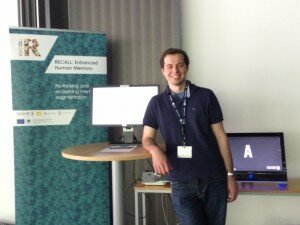Last week researchers from RECALL presented a series of papers, a tutorial and demonstration at the PerDis 2015 symposium in Saarbrucken, Germany.

The presence of ubiquitous displays (both in the environment and via personal devices such as smartwatches and Google Glass) provides many new opportunities for displaying memory cues to trigger recall. The PerDis symposium is focused on communication through and use of pervasive display systems in public and semi-public spaces and such displays have huge potential for helping to deliver memory cues in the future. However, presenting memory cues on public displays poses new challenges, and as part of our research into memory visualisation we are exploring these. For example, development of new scheduling architectures and personalisation models for memory augmentation through public displays.
At the PerDis symposium, our researchers presented their work in the domain of public displays and engaged in many interesting conversations with others who were excited about memory augmentation as a new application domain for digital signage and pervasive displays. We were really pleased to get such positive feedback and hope that this topic will continue to excite the community.
